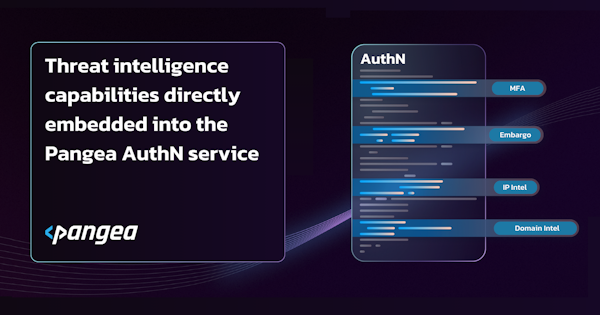We’re excited to announce a new partnership with WhoisXML API, enabling new use cases with WHOIS data in Pangea’s Domain Intel service, bringing even more value to developers!
Who is WhoisXML API?:
WhoisXML API delivers the most comprehensive domain, IP, DNS, and cyber threat intelligence data to enable a more secure and transparent Internet for all businesses. Together with Pangea’s API-based security services, and specifically our domain intelligence endpoint, developers can quickly and easily gain access to a wide range of data about domains, including domain age, contact information, and registration history. This data can be used to identify malicious domains and protect against domain-based attacks.
WhoisXML API's data is one of the most comprehensive and accurate sources of WHOIS data available. Their products are the result of advanced and innovative machine learning and data science processes augmented by over a decade of experience and successful partnerships with key internet security players. Our partnership with WhoisXML API brings a unique data set to strengthen the bench of threat intel providers on the Pangea platform.
How can this data be used?
As an example, consider new users registering for your site and communicating with employees or other users. The potential for exposure to unmoderated content like phishing pages, scams, and spam can pose various risks to your users. While intel services can help to protect users from these threats, they are not always effective when a domain is newly created or intentionally obfuscated. For example, a phishing page may be designed to look like a legitimate website, and URL or domain reputation solutions may not be able to detect it. However, through domain age analysis, newly created domains can be blocked and the risk of users being exposed to malicious content is reduced.
There are a few reasons why this makes sense:
Fraudulent sites are often much younger than legitimate sites.
Malicious sites are often shut down or abandoned soon after they are discovered.
Most of the sites that users have a legitimate reason to visit will be established sites that have existed for longer than one month.
There should be relatively few instances where a user has a legitimate reason to post or share content linking to a website hosted on a newly created domain. By blocking newly created domains, you can help keep users safe.
Some additional example use cases of how Pangea users can utilize WhoisXML API data include:
Identify malicious domains based on their registrant data: users can look for domains that have unusual contact information.
Protect against domain-based attacks such as domain hijacking and domain spoofing: users can monitor the registration status of their domains to ensure that they are not hijacked.
Get insights into the domain market: users can track the registration of new domains, or the transfer of existing domains.
Our new Partner services will be GA on Oct 25th 2023, the Domain Intel Service Endpoints are:
- Domain Reputation (WhoisXMLAPI): This endpoint allows a user to query the WhoisXML API dataset for data on a given domain including:
Domain name
Registration date
Expiration date
Status (e.g., active, suspended, deleted)
Registrar
Registrant information (e.g., name, address, email address)
Name servers
Updated date
In addition to this basic information, the WhoisXML API Whois API also returns a number of other data points, such as:
Domain age
NS records
WHOIS server
Visit our documentation for more information and to learn how to add these smart security features into your next application using Pangea.
And, if you’re interested in trying out our Domain Intel service, or the rest of our API-based security services, we've got another hackathon kicking off November 1 on the Hashnode platform.
Follow us on Twitter and LinkedIn to stay connected and join our community Slack channel where we have a team of developers ready to help support your next project and answer any questions you have.




